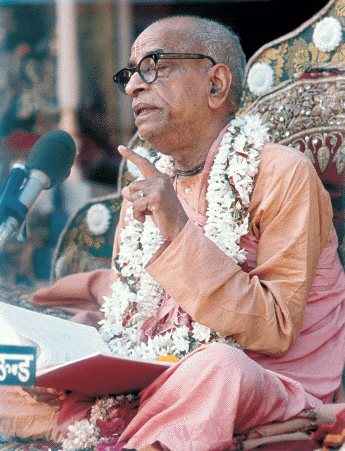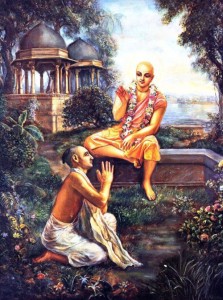
Hare Krishna and Pranam dear devotees,
I am posting a blog after a long gap. What better to start by reading some nectar from Srila Prabhupada. I am sharing a very instructing excerpt from a lecture Srila Prabhupada gave in Vrindavan in 1972. Please read it carefully.
Prabhupada– So, in devotional service there are three stages,” “The kanistha-adhikari, the madhyam-adhikari, and the uttama-adhikari, or beginning, middle, and advanced stages. In the beginning, kanistha-adhikari, the devotee engages in Deity worship, makes offerings to the Deity, cleans the floor, etcetera. This isn’t to say that Deity worship is lower than meditation. It’s just the beginning stage.
“Sometimes the kanistha-adhikari thinks that he has realized Krishna just because he has worshiped the Deity nicely, but he must make further advancement. When we say ‘Krishna,’ we do not refer to Krishna alone, but to all of His energies and paraphernalia. When we say, ‘The king is coming’ we don’t mean that the king is coming alone. His ministers, secretaries, queens, soldiers—everyone is coming. Similarly, Krishna is the root of all emanations, and when He comes, His devotees also come with Him. When we recognize Krishna’s devotees and pay them respects, we are further advanced. If a pure devotee comes, the pujari can immediately stop the aratik and go to receive him. Krishna is satisfied more when His devotee is worshiped. That’s a fact.
“Yasya prasadad bhagavat-prasado yasya prasadan na gatih kuto’pi. The spiritual master is the representative of God because he’s engaged twenty-four hours daily in Krishna’s service. The spiritual master is considered as good as Hari because he’s Krishna’s most confidential servant. Worship of the spiritual master is not artificial or concocted: it’s recommended in all the Shastras. Advanced devotees accept this and treat the spiritual master accordingly.
“Although the spiritual master is offered respects like Hari, he doesn’t think himself Hari. He considers his disciples to be his spiritual masters. He thinks, ‘Krishna has sent me so many spiritual masters.’ He doesn’t even think of himself as a guru but as a servant to his disciples, because Krishna has given him the task to train them.
“When one is advanced, he can see the importance of other devotees. An advanced devotee never offends another devotee. That is a very serious offense. Therefore we address one another as ‘Prabhu.’ This should not simply be spoken with the lips. It should be realized. One should think of other devotees as his prabhus, his masters. Not that he should try to become master himself.
We should always be willing to offer respects not only to other devotees but to everyone. Everyone. Why? Because every living entity is originally a devotee of Krishna. Circumstantially, being covered by the modes of nature, he seems like a demon, but his original nature is that of Krishna’s servant.
“The process of bhakti really begins when one is self-realized. Before that, if one engages in Deity worship yet thinks that he is the body and does not give respect to devotees, he is at the first stage, kanistha-adhikari. Although seated on the material platform, he’s trying to improve his condition by following the directions of the spiritual master and Shastra.
“We should not remain perpetual neophytes. We should try to advance to madhyam-adhikari. On this platform, we distinguish between four different kinds of living entities: Krishna, Krishna’s devotees, innocent people, and atheists. We should not superficially say, ‘In my view, everyone is the same.’ Of course, that is the last stage, but because we are neophyte, this is not our vision. This vision of the maha-bhagavat should never be imitated. Imitation is artificial.
“In the second stage, that of madhyam-adhikari, one treats all types of men according to their position and tries to increase his love for the Supreme Personality of Godhead and also make friends with the devotees. He doesn’t envy the devotees. If a devotee is superior, we should take lessons from him; if equal, we should make friends with him; and if lower, we should try to help him.
“A madhyam-adhikari does not simply give respect to other devotees: he teaches others to become devotees as well. This means preaching. A preacher should approach others and say, ‘You’re wasting your life in material activities. You should become Krishna’s devotee.’ This is preaching. One should preach Krishna consciousness to the innocent. The atheists should be avoided because as soon as an atheist hears about God, he becomes envious and vicious.
“At the last stage, that of maha-bhagavat or uttama-adhikari, one doesn’t see devotees and nondevotees. He sees everyone as a better devotee than himself. Nor does he pretend to have this consciousness. No. He actually thinks like this. He’s naturally humble: he wants to pay respects to everyone, and he wants no respect for himself. If one wants respect for himself, he’s still at the secondary stage. The maha-bhagavat is ready to give respect even to an ant.
“When one attains this highest platform, there’s no more friend, no more enemy, no more preaching. The maha-bhagavat sees everyone engaged in the Lord’s service, with the exception of himself. This platform, however, should not be imitated. It must be sincere, not superficial.
“Those who are preachers must remain on the second platform, that of madhyam-adhikari. Even when a maha-bhagavat wants to preach, he must come down to that second platform. He cannot remain on the highest and preach. He plays the part of second-class devotee. For instance, in the Bible, Lord Jesus Christ said, ‘I have many things to say, but you are not qualified to understand them.’
( Lecture, 23rd Oct 1972, Vrindavan)
There are many gems in the above excerpt. However I wish to focus upon if we could see how Srila Prabhupada expects every ISKCON devotee to graduate to the level of a madhyam-adhikari, he does not want us to become complacent in Bhakti, which affects many of us. He also instructs us what qualities an aspiring devotee should develop to come to the platform of a madhyam-adhikari.
There is nothing bad in being in a primary school, everyone has to go through it but one does not remain in a primary school, one graduates to secondary school. The same is true for Krishna consciousness as well.
And lastly, we heard how important it is to be engaged in preaching service, which attracts even a Maha-bhagavat or an uttama-adhikari to come down to the level of a madhayam-adhikari. Like Srila Prabhupada did.
In the next blog, I will share from the above-quoted lecture, Srila Prabhupada’s instruction on how to preach properly.
All glories to Srila Prabhupada.
Your servant,
Giriraj dasa


